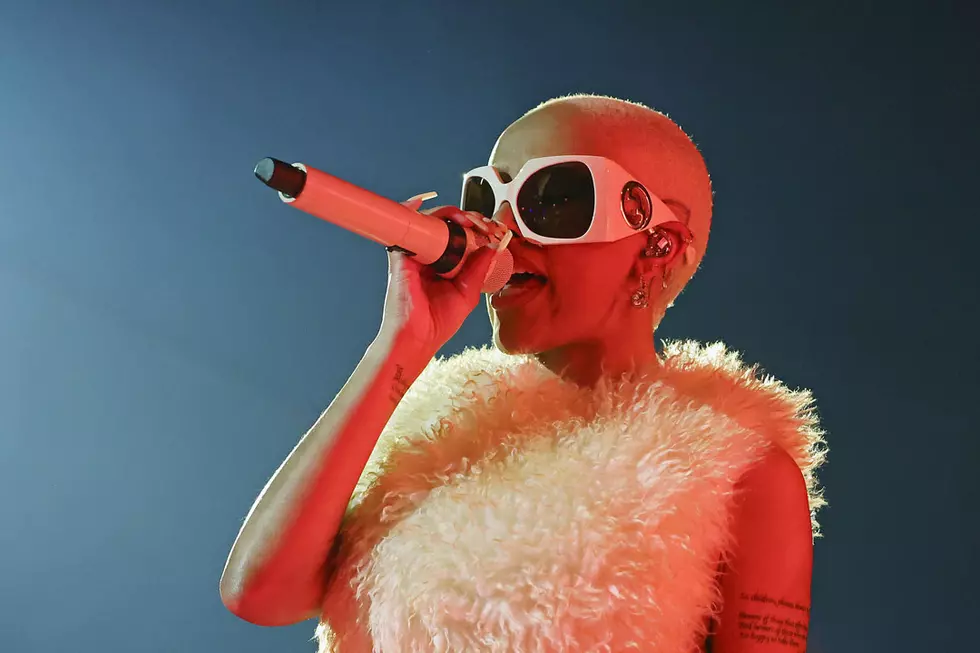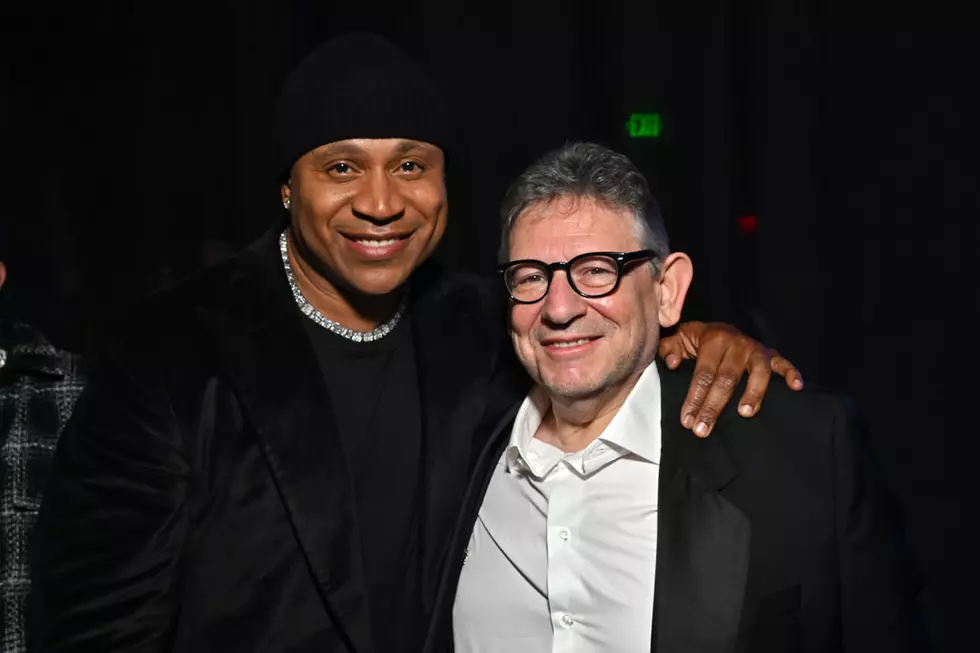
Mick Jenkins On Ferguson Decision: “We Aren’t Cared About In Our Society”
After last night's announcement that a grand jury refused to indict white police officer Darren Wilson for the killing of unarmed black teenager Michael Brown this past August, the chaos that erupted in Ferguson, Mo. as a result of clashes between protesters and police were broadcast across the world. Much of the outcry—against the violence, against the controversial television coverage, against, most importantly, the decision to not indict Wilson—played out over social media, where the hip-hop community was loud and vocal in its response. Others—Killer Mike, Q-Tip, Talib Kweli—responded with action, whether it be an impassioned speech on stage, taking a leadership role in protests in Times Square or helping set up a crowdsourced defense fund for protesters.
The #FergusonDecision, as it was hashtagged on Twitter last night, has implications for society as a whole. But the main target demographics that are, and will continue to be, affected by the decision are young black males across the country. XXL spoke to 23-year-old Chicago rapper Mick Jenkins, an up-and-coming talent making serious waves in a city exploding with talent with his recent mixtape, The Waters, about the issues surrounding the situation in Ferguson and what, if anything, can be done about it. —Dan Rys
XXL: What was your reaction last night when you heard that the grand jury was not going to indict Darren Wilson?
Mick Jenkins: I was a little sad, for sure.
Were you expecting it?
Yes. I wanna say first that I wasn't a part of the thinking that... That doesn't solve anything, if Darren Wilson were to get arrested. That doesn't really solve anything at all, and I'm in the business of solving the actual problem. I wasn't surprised for real, I think the only emotion I really felt was just a kind of sadness, just another instance proving that we're not really cared about in our society. But when I say I expected it, it's in the sense that I already knew that we aren't cared about in our society.
It was like a sadness of the inevitability of it.
Yeah, for sure, for sure. It's happened before—it happened in Cleveland the other day with a 12-year-old boy—it is the nature of our society. I think the only way to solve the problem, or whatever people view as the problem, is love. And unfortunately, that sounds so cliche that it's hard to implement anything that could resemble that effectively being shared amongst people, across cultures, throughout our society, throughout the the police force, throughout whatever. That just sounds like, "Oh, love is gonna fix it," you know what I'm saying? And then it just begs the question of how do you do that, and if arresting Darren Wilson isn't the solution then what is the solution, and what that could be.
I mean, to find the solution then you go back to the question of, what is the problem. What do you see as the problem that led to that scenario?
There's several problems, and that's what I'm saying, I think that's the one: the lack of love. The hatred that you have for yourself, or people. I feel like acting in that way, with the 12-year-old boy getting shot, with Trayvon Martin getting shot, with Mike Brown getting shot, the value of a black man is not the same as the value of a white man. I think it's interesting that we've had several people who have shot up schools and we were able to bring them in uninjured and alive and these young men who were either doing nothing or doing something that pales in comparison to the other crimes had to be apprehended dead. You know what I'm saying? I think that's interesting, and I think that speaks to the value of a life from the person holding the gun.
There's also the whole reaction to what is being called protests on one side and riots on the other—
[Laughs] And that's the thing. I think that's a reason why I don't have a lot of faith in our society or our government or our—I mean, not even yesterday, but the whole Mike Brown situation. We knew what happened, there were witnesses, and it was being reported a completely different way on TV. And that's the same thing that's happening with the protests and what's happening post-Decision, as far as Darren Wilson is concerned. I don't know, man. I feel like—my attitude isn't in any way nonchalant—but we know this. We know this. We know we're not cared about, we know the government—not even just black people—doesn't care. I don't feel that it's here for the progression of people, of society. It's not here to solve world hunger. It's not here to solve poverty. It's not here to solve these things. There are better alternatives to what we do across the board. There's a better alternative to the hungry. There's a better alternative for the way we pass laws.
There's a better alternative to a lot of our problems, and it's not rocket science. Just, that isn't the goal of our government or the world leaders, the powers that be. It's not to see a prospering, a smart, a strong society. That's not the goal. If it was the goal, we'd be doing a lot of things differently. Our police would actually be serving and protecting. We would have cameras. They would be trained a different way. And those are being spoken about in the wake of this. "Maybe we should train our police officers better. Maybe we should put cameras on police." Those aren't being implemented, and those make perfect sense. I feel like when things like that aren't spoken about with a level of seriousness, when they're turned down, it's just further proving that we're not here for progression, for safety, to actually serve and protect the people as a whole.
I feel like the saddest part is the feeling of resignation. Like you said, we know this. We knew that this was going to happen, that it happened again. People talking about putting cameras on cops—I feel a sense of resignation that that's never gonna happen, either. That they're just talking about it because it's something to be talked about now.
Yeah, and that's what I'm saying. 'Cause that makes perfect sense. "How do we police the police?" "Well, we should be able to watch them." "Who's gonna watch them?" "Oh, the camera in the dashboard." There was a big fuss about that getting done. Well, that gets done, but they got the ability to turn it off. Well, alright, let's put a camera on the body. Well that makes perfect sense as well. And the more it gets talked about and no infrastructure happens to make it a reality, and then we forget about it, and then it doesn't happen, it's just like... I mean, what even is it that needs to be said?
I feel like the power to change things comes from the people, and when there's an obvious divide amongst the people, amongst the majority and minority, what are we gonna change? How can we change? Because we need everybody. We don't need all the black people, we don't need all the minorities, we need everybody. And since the way to change it through laws and legally, we need everybody—and we don't have everybody—for me, my thoughts are, the only way to change it is to change the way that people think. Change their hearts.
For all these people that are supporting Darren Wilson—sending him money, thanking him—people don't like to look at it this way, but they are victims, too. They are victims of that way of thinking. Like, that racist child who's growing up in this time, who's watching Darren Wilson—
They're being indoctrinated.
They're being indoctrinated to it. And in 15 years they won't see how it affected them this way, but it does in a major way. And it's only continuing the cycle, you know what I'm saying? So to combat that, you gotta really talk to people, you gotta really connect with people, you gotta really chance people. And that is so difficult to be done on a mass scale, you know what I'm saying? So to look at it with this logic it almost seems pointless, or purposeless, or helpless. But I really feel like connecting with people one on one, face to face and just trying to change somebody's mind is really the only way to do it in the realm of what I can actually do. But yeah, man. It's a downer, for sure.
I feel like the hardest thing is that when you're resigned to it, when you're beaten down by the inevitability of it, then how do you make that change that you're talking about?
I mean, I think for myself it just has a lot to do with my resolve as a person and the kind of things I push for. I believe in the Bible, I'm a Christian, I believe in God. And that's another thing that gives me solace when I think about, oh, this is something that we can't help. Because believing in the Bible, things are supposed to get worse. We're approaching the end of the world. Crazier things are going to happen. Natural disasters are going to happen, according to my beliefs. People are going to get wilder, you know what I'm saying?
So that gives me a lot of peace of mind in thinking about how the world is. And then it gives me a lot of faith and confidence when I'm like, alright, what am I gonna do about this? How can I try and change this? And talking to these people one on one, trying to reach people through music, trying to actively be a part of change, even if it is small, that's all I feel like I can do. That's what I have to do. It doesn't matter if it's miniscule. That's what I gotta do. I can't focus on my anger with the issue, I can't focus on my sorrow, I can't worry about that. Once I made the decision to actively be a part of the change, I've got to worry about and be a part of the change. And not focus on the negatives or the inevitables. Because they're inevitable.
Related: Killer Mike On Ferguson Decision: “We Know You Don’t Value My Skin”
Q-Tip Is Helping Lead New York’s Ferguson Protests
Macklemore Protests The Ferguson Decision After Officer Darren Wilson Ruling
Mick Jenkins’ “Dehydration” Video Shows The Reality Of Gun Violence In Chicago
Mick Jenkins Impresses With Sophomore Mixtape The Waters
The Break Presents: Mick Jenkins
More From XXL









